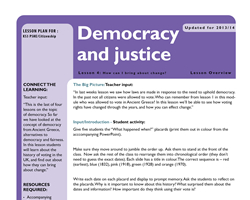New to Safeguarding Essentials?
Subscribe Now
|
Existing members
Sign in
here
Citizenship Lesson Plans / KS3 - Democracy - 4 lessons / Democracy Lesson Plan 4 - How Can I Bring About Change?
There are 2 Documents available to download for
Democracy Lesson Plan 4 - How Can I Bring About Change?
Students look at ways that they can bring about change in a democratic system.

- TRS Citizenship Democracy Lesson 4 PDF Downloads = 51
- TRS Citizenship Democracy Lesson 4 PPT Downloads = 62
Connect the Learning
Teacher input:“This is the last of four lessons on the topic of democracy. So far we have looked at the concept of democracy from Ancient Greece, alternatives to democracy and fairness. In this lesson students will learn about the history of voting in the UK, and find out about how they can bring about change.”
The Big Picture
Teacher input:
“In last weeks lesson we saw how laws are made in response to the need to uphold democracy. In the past not all citizens were allowed to vote. Who can remember from lesson 1 in this module who was allowed to vote in Ancient Greece? In this lesson we’ll be able to see how voting rights have changed through the years, and how you can effect change.”
Learning Outcomes
1.1 Democracy and justice
1.Participating actively in different kinds of decision-making and voting in order to influence public life.
2.Weighing up what is fair and unfair in different situations, understanding that justice is fundamental to a democratic society and exploring the role of law in maintaining order and resolving conflict.
3.Considering how democracy, justice, diversity, toleration, respect and freedom are valued by people with different beliefs, backgrounds and traditions within a changing democratic society.
4.Understanding and exploring the roles of citizens and parliament in holding government and those in power to account.
Input/Introduction
Student activity:
Give five students the “What happened when?” placards (print them out in colour from the PowerPoint TRU_CitizenshipKS3_democracy_L4).
Make sure they move around to jumble the order up.
Ask them to stand at the front of the class.
Now ask the rest of the class to rearrange them into chronological order (they don’t need to guess the exact dates).

